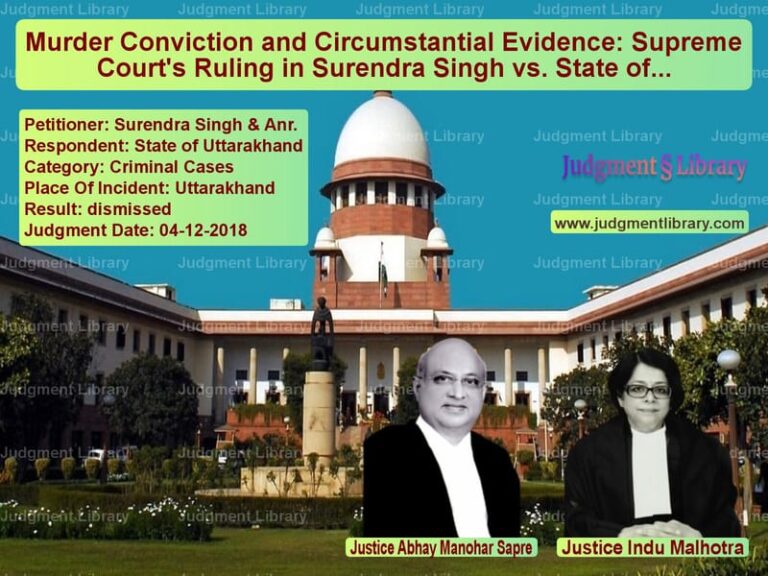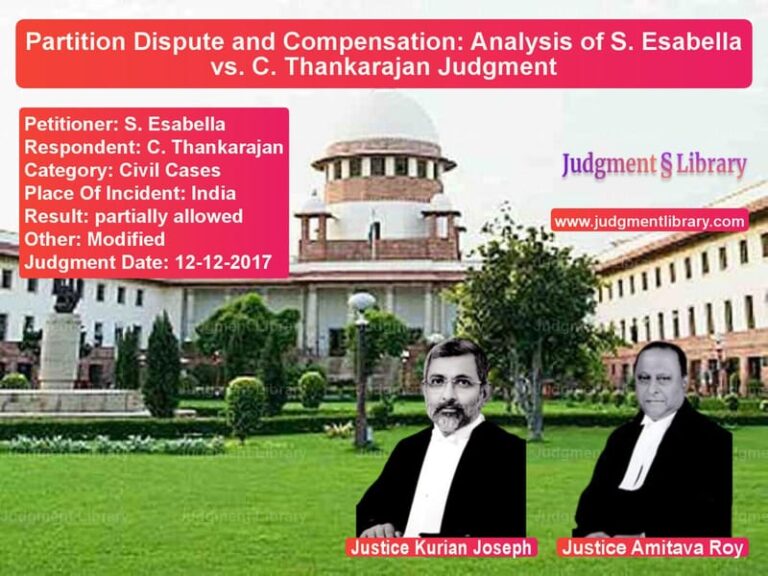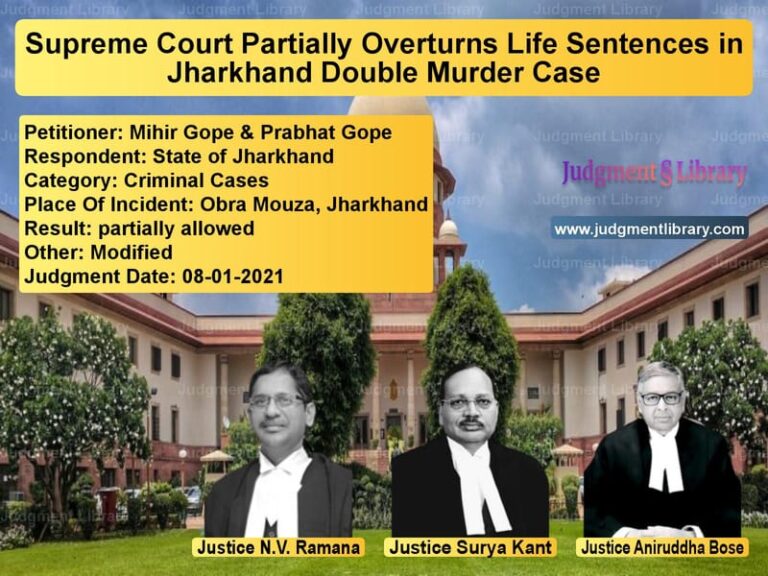Redemption of Mortgage: Supreme Court Upholds Right of Mirashi Tenant
The case of Shankar Sakharam Kenjale (Died) Through Legal Heirs vs. Narayan Krishna Gade & Anr. revolved around the redemption of a mortgage concerning watan land. The Supreme Court examined the impact of the Bombay Paragana and Kulkarni Watans (Abolition) Act, 1950, on the rights of a Mirashi tenant who had mortgaged the land. The Court ruled in favor of the Mirashi tenant, affirming that their right to redeem the mortgage was not extinguished by the resumption of the land by the government.
Background of the Case
The suit land was originally watan property governed by the Bombay Hereditary Offices Act, 1874. It was in the possession of a Mirashi tenant, Ramchandra, who executed a mortgage deed in favor of Shankar Sakharam Kenjale on 14.05.1947 for Rs. 900. The mortgagee was placed in possession of the land with a repayment period of ten years.
With the enactment of the Bombay Paragana and Kulkarni Watans (Abolition) Act, 1950, all watan lands were resumed by the government. The original watandar did not apply for re-grant, but the mortgagee obtained the land’s re-grant by paying the occupancy price in 1960.
The successors of the Mirashi tenant later filed a suit for redemption of the mortgage, which was dismissed by the trial court and the first appellate court. However, the Bombay High Court ruled in favor of the Mirashi tenant, prompting the mortgagee’s legal heirs to appeal before the Supreme Court.
Key Legal Issues
- Did the Mirashi tenant’s right to redeem the mortgage survive the resumption of the land under the Abolition Act?
- Did the mortgagee acquire absolute ownership of the land upon re-grant?
- Did the principle of trust under Section 90 of the Indian Trusts Act apply to the mortgagee’s re-grant?
Petitioner’s Arguments (Legal Heirs of Mortgagee)
- The petitioners argued that once the land was resumed by the government, all previous rights, including those of the mortgagor, were extinguished.
- They contended that upon re-grant, the mortgagee became the absolute owner, and the Mirashi tenant had no right of redemption.
- They relied on Collector of South Satara vs. Laxman Mahadev Deshpande and Malikarjunappa Basavalingappa Mamle Desai vs. Siddalingappa, arguing that re-grant created new ownership rights.
Respondent’s Arguments (Legal Heirs of Mirashi Tenant)
- The respondents argued that the tenancy rights of the Mirashi tenant survived even after the resumption of the land under the Abolition Act.
- They contended that the mortgagee obtained re-grant solely due to their possession as a mortgagee and should hold it for the benefit of the original mortgagor.
- They relied on Jayasingh Dnyanu Mhoprekar vs. Krishna Babaji Patil and Namdev Shripati Nale vs. Bapu Ganapati Jagtap to argue that the benefit of re-grant must accrue to the mortgagor under Section 90 of the Indian Trusts Act.
Supreme Court’s Observations
The Supreme Court analyzed the relevant provisions and held:
- The Mirashi tenant’s tenancy rights survived the resumption of land due to the proviso in Section 3(3) and Section 8 of the Abolition Act.
- The Bombay Tenancy and Agricultural Lands Act, 1948, continued to govern the tenancy rights, protecting the Mirashi tenant.
- The mortgagee was able to obtain re-grant solely because of their possession due to the mortgage. This benefit could not be used to extinguish the mortgagor’s rights.
- Under Section 90 of the Indian Trusts Act, if a mortgagee gains an advantage using their position, they must hold it for the benefit of the mortgagor.
The Court stated, “The re-grant to the mortgagee based on actual possession cannot be divorced from the existence of the mortgagor-mortgagee relationship. Therefore, any benefit accruing to the mortgagee must necessarily enure to the Mirashi tenant–mortgagor.”
Final Judgment
The Supreme Court dismissed the appeal and upheld the High Court’s judgment:
- The mortgagee was required to transfer the land back to the Mirashi tenant upon repayment of the mortgage amount.
- The right of redemption of the mortgagor was protected despite the re-grant.
- The re-grant was deemed to have been obtained on behalf of the original Mirashi tenant.
Implications of the Judgment
This ruling has significant implications for mortgage and tenancy laws:
- Tenants under abolished watan lands retain their rights unless explicitly extinguished by law.
- Mortgagees obtaining re-grant based on possession cannot claim independent ownership if the original mortgagor had a valid right of redemption.
- The principle of trust under Section 90 of the Indian Trusts Act applies to mortgagees obtaining re-grant.
The judgment ensures that mortgagees cannot unjustly enrich themselves by taking advantage of their possession and reinforces the equitable principle that a mortgage remains a mortgage until redeemed.
Petitioner Name: Shankar Sakharam Kenjale (Died) Through Legal Heirs.Respondent Name: Narayan Krishna Gade & Anr..Judgment By: Justice Mohan M. Shantanagoudar, Justice R. Subhash Reddy.Place Of Incident: Maharashtra.Judgment Date: 17-04-2020.
Don’t miss out on the full details! Download the complete judgment in PDF format below and gain valuable insights instantly!
Download Judgment: Shankar Sakharam Ken vs Narayan Krishna Gade Supreme Court of India Judgment Dated 17-04-2020.pdf
Direct Downlaod Judgment: Direct downlaod this Judgment
See all petitions in Property Disputes
See all petitions in Succession and Wills
See all petitions in Contract Disputes
See all petitions in Judgment by Mohan M. Shantanagoudar
See all petitions in Judgment by R. Subhash Reddy
See all petitions in dismissed
See all petitions in supreme court of India judgments April 2020
See all petitions in 2020 judgments
See all posts in Civil Cases Category
See all allowed petitions in Civil Cases Category
See all Dismissed petitions in Civil Cases Category
See all partially allowed petitions in Civil Cases Category







